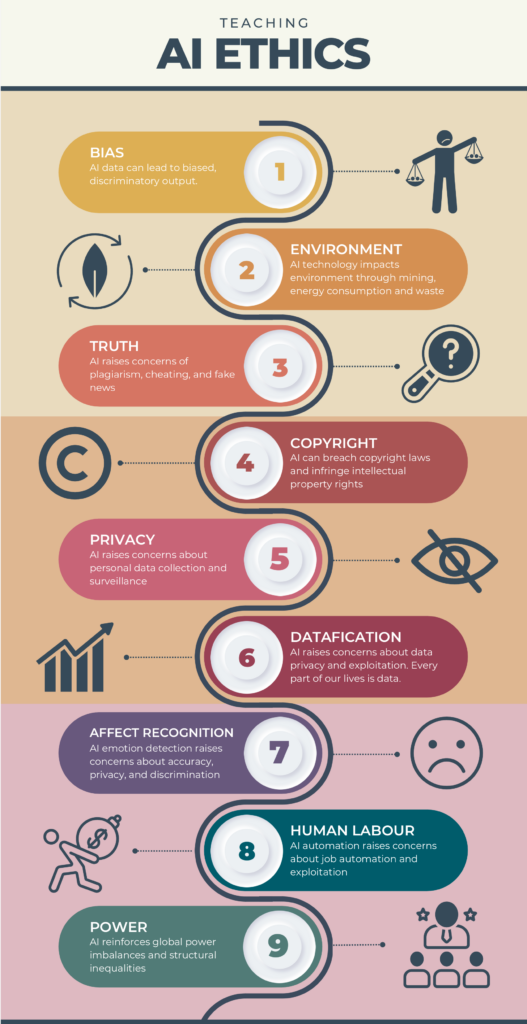
Digital education reading group: March 2024
In less than two years we have seen incredible changes in the possibilities provided by GenAI. It promises increased creativity and efficiency, better quality work and even improved health outcomes. But, at the same time, there are concerns about its misuse, job losses, exploitation, disregard for intellectual property and its impact on human rights and democracy.
This month the digital education reading group will consider the ethical principles surrounding the use of GenAI today. There are 17 sources for you to choose from! We don’t expect you to read/watch them all; if you’re short on time, I recommend These Women Tried to Warn Us About AI and Have we passed ‘Peak Ethics’ in AI? for two contrasting perspectives.
Are these concerns real, or just tech doomerism?

Questions for us to consider
- How have you used GenAI in your work? How do you feel about that?
- Do educators need to change their practice in response to GenAI?
- What’s the problem with GenAI?
- Should we stop moralising about GenAI and get on with using to help with real-world projects? – It would be unethical not to!
- Is “tech doomerism” a helpful term? Does it conflate two perspectives (AI will destroy the world vs the more nuanced AI is bad for x reasons).
- Can GenAI provide personalised learning without compromising important educational principles?
Resources
A collection of resources gathered by Tim Hall and Anna Armstrong.
A revision: What do we mean by Generative AI?
1. Cropp, N. (2023) So Whats The Difference Between AI, GAI, ML, LLM, GANs, and GPTs? Linkedin
Linkedin article. A much needed history lesson on all the different branches of AI.
2. Tucker, E. (2022) Artifice and Intelligence, Center on Privacy & Technology
Blog post. Tucker explains why she and her team will stop using the terms “artificial intelligence,” “AI,” and “machine learning” in thier work to expose and mitigate the harms of digital technologies in the lives of individuals and communities.
3. EDUCAUSE (2023) 7 Things You Should Know About Generative AI
Web page. EDUCAUSE 7 Things You Should Know About… is a long-running series covering emergent and influential technologies and practices in higher education. This one asks: What is it? How does it work? Who’s doing it? Why is it significant? What are the downsides? Where is it going? What are the implications for HE?
What’s the problem with Generative AI?
1. O’Neil, L. (2023) These Women tried to warn us about AI Rolling Stone
Magazine article. Two years ago Timnit Gebru and colleagues looked at the ways LLMs could reflect black bias and reinforce stereotypes and prejudices. They found that the training data has problematic characteristics resulting in models that encode stereotypical and derogatory associations along gender, race, ethnicity, and disability status. “White supremacist and misogynistic, ageist, etc., views are overrepresented… not only exceeding their prevalence in the general population but also setting up models trained on these datasets to further amplify biases and harms.”
2. Lanclos, D. (2023) “The Future” is Bullshit EDEN 2023 Annual Conference, Dublin
YouTube video. In this 5 minute presentation (from 43-48 min), Donna Lanclos argues that LLMs are bullshit generators, generating content without regard for truth or worth, and proposes that we should focus on process not product.
3. Lawton, G. (2023) Generative AI Ethics: 8 Biggest Concerns and Risks, TechTarget
A blog post exploring how generative AI poses ethical issues relating to data privacy, security, misinformation, plagiarism, copyright infringements and harmful content.
4. Cho, R. (2023) AI’s Growing Carbon Footprint – State of the Planet Columbia Climate School
Blog post. The world’s data centres emit more greenhouse gasses than the aviation industry. So can AI help combat climate change, or is it contributing to it?
5. Deloitte AI Institute (2024) Generative AI and the Future of Work
Short article introducing the way AI is changing work and its impact on humans.
6. IBM and Ahuja, R. (2024) Generative AI: Impact, Considerations, and Ethical Issues Coursera
A 5 hour Coursera course offered by IBM: In this course, you will explore the impact of generative artificial intelligence (AI) on society, the workforce, organizations, and the environment. In this course, you will learn about the ethical concerns of generative AI, including data privacy, biases, copyright infringement, and hallucination. You will identify the misuses related to generative AI, including deepfakes.
Cynics should embrace GenAI – it would be unethical not to
1. Clark, D. (2024) Have we passed ‘Peak Ethics’ in AI? Donald Clark Plan B
In his blog post, Donald Clark argues that much of the concern about the ethical implications of AI has not materialised into real-world consequences. He highlights the rapid advancements in AI technology, emphasising its positive impacts on productivity, creativity and healthcare. He concludes by comparing today’s concerns about AI to yesterday’s concerns about the sundial, writing, books, computers, the internet….as sensationalist and fear-mongering.
2. Mishra, P. (2024) Education in an age of Generate AI: Keynote presentation University of Michigan Flint
YouTube video. Punya’s keynote (37 min) at the University of Michigan-Flint discusses the transformative potential of generative AI in education. Would it be ethical to disengage from using GenAI? He calls for us to adopt a long-term view of generative AI’s implications, emphasising the need to prepare students for a future where AI plays a significant role in society.
3. Mollick, E. (2023) The future of education in a world of AI One Useful Thing
Blog post. “Throughout history, educators have demonstrated their ability to adapt to technological advancements and societal shifts. Change is coming to classrooms, and I think it is important to focus on a positive vision to help guide as through the uncertain times ahead.”
4. MIT (2024) Generative AI + Education Afternoon Lightning Talks MIT Generative AI Week
YouTube video. A 10 min showcase of six lightening talks sharing GenAI projects at The Massachusetts Institute of Technology (MIT).
Developing ethical practices
1. Conitzer, V.D. (2024) How ChatGPT has been prompted to respect safety, fairness, and copyright Oxford Institute for Ethics in AI
Blog post. Can’t you just tell the bot how you want it to behave? Generative AI tools need to create content that is helpful without causing harm…even if their training data enables such responses. They should also respect intellectual property, avoid harmful stereotypes, and fairly represent all groups. Guiding AI to behave appropriately can be achieved through various methods, including providing simple natural language instructions on expected behavior
2. Leslie, D. (2019) Understanding artificial intelligence ethics and safety: A guide for the responsible design and implementation of AI systems in the public sector The Alan Turing Institute
Report. Worth skimming to find relevant recommendations for good practice. Guidance on the responsible design and implementation of AI systems in the public sector. “AI ethics is a set of values, principles, and techniques that employ widely accepted standards of right and wrong to guide moral conduct in the development and use of AI technologies”. (p3)
3. Bender, E.M. (2021) On the dangers of stochastic parrots: Can language models be too big?
YouTube video. 30 min presentation followed by Q&A. Professor Emily M. Bender presents her recent paper. Taking stock of the recent trend towards ever larger language models they take a step back and ask: How big is too big? What are the possible risks associated with this technology and what paths are available for mitigating those risks? (Original paper: https://doi.org/10.1145/3442188.3445922)
4. Upsher, R. (no date) Assessment Innovation integrating Generative AI: Co-creating assessment activities with Undergraduate Students King’s College London
Web page. Are there ethical approaches for incorporating GenAI into assessment? In this example, King’s are investigating an approach, co-creating assessments with students.
5. QAA (2024) Quality Compass: Navigating the complexities of the artificial intelligence era in higher education
QAA Report highlighting the key challenges and opportunities posed by generative AI in UK higher education.
List of topics discussed at previous meetings
